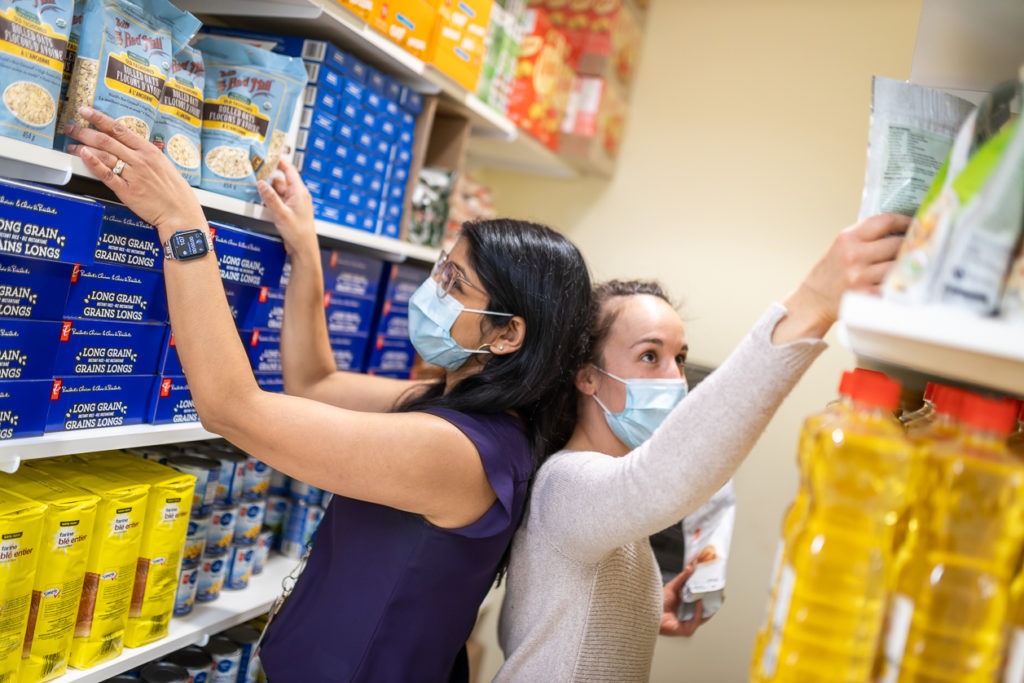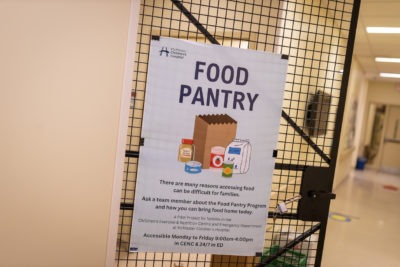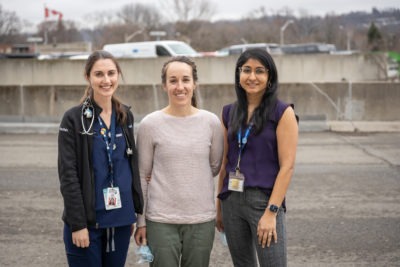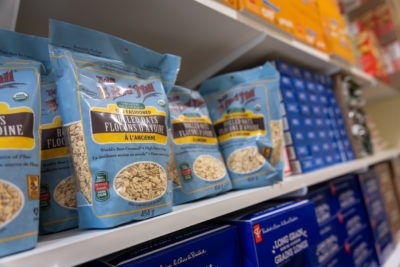
HHS Food Pantry program supports patients/families facing food insecurity
More than one in four families visiting MCH’s emergency department reported challenges accessing enough food
Hamilton Health Sciences (HHS) has started a food bank-type program at McMaster Children’s Hospital (MCH) for patients and their families facing food insecurity. The Food Pantry pilot program launches on April 3 and is available to families visiting the hospital’s emergency department (ED) and Children’s Exercise & Nutrition Centre (CENC).

Posters at McMaster Children’s Hospital let visiting families know how to access the Food Pantry program.
Proof of need is not required, but children must be patients in the ED or CENC. Families can receive food to take home by letting their child’s nurse or doctor know they would like to participate. The ED arm of the Food Pantry program provides one take-home meal of non-perishable food items for the patient’s family, while CENC offers a food bank where families can select groceries from a pantry during their child’s appointment.
Food includes canned soups, fruits, vegetables, proteins and grains with vegetarian, vegan and halal options.
“Our Food Pantry won’t solve food insecurity because that’s a much larger societal issue, but it does allow our teams to support patients and their families in the short term as partners in helping their children get better,” says Jennifer Fabe, an MCH registered dietitian and clinical specialist.

Dr. Nikhil Pai, co-chair of MCH’s pediatric nutrition advisory committee.

Jennifer Fabe, co-chair of MCH’s pediatric nutrition advisory committee.
Fabe is co-chair of MCH’s pediatric nutrition advisory committee along with pediatric gastroenterologist Dr. Nikhil Pai. The committee was instrumental in securing funding from Hamilton Health Sciences Foundation for the two-year pilot. A successful pilot could support expanding the Food Pantry program across MCH, and to other HHS hospital sites.
Nourishing patients and their families
While it’s common practice for hospitals to provide food and snacks for the visiting family members of inpatients, MCH’s pantry program could be the first of its kind provincially or even nationally to send food home with outpatients. “We aren’t aware of any other such Canadian program,” says Fabe.
The hospital has partnered with a local Fortinos for discounted food and is looking to expand its list of partners for this important community initiative. “Community partnerships will be especially important as we grow this program,” says Pai.
Take-home meal for ED patients/families
The program’s ED arm provides a take-home meal for families leaving the hospital after their child is seen. These healthy, culturally appropriate meals consist of non-perishable items and are available 24/7.

Left to right: Dr. Ellie MacBain, Stephanie Tibelius and Jane Manayathu Jones
Meals help support the patient’s recovery at home, says Stephanie Tibelius, an MCH registered dietitian. For example, the family of a child with a stomach flu could take home a meal that’s gentle on the stomach, such as chicken and rice stew with crackers.
Tibelius and Jane Manayathu Jones, a nurse practitioner with MCH’s Pediatric Lipid Clinic, were instrumental in establishing the pilot program, and hope to see it offered permanently across HHS.
Groceries for CENC patients/families
Patients and their families visiting the CENC for their monthly appointments can access a pantry stocked with non-perishable food, and take home a bag of groceries at each visit. Food Pantry hours at the CENC are Monday to Friday, 9 a.m. to 4 p.m.
The need for a hospital program addressing food insecurity was made clear in a recently-published article by MCH doctors.

The Children’s Exercise & Nutrition Centre offers a food bank where families can select groceries from a pantry during their child’s appointment.
“The canned, dried and jarred foods support the therapeutic needs of our patients,” says Tibelius. For example, a family with a child visiting the CENC’s Pediatric Lipid Clinic for high blood triglycerides – a type of lipid disorder – could take home foods rich with Omega 3 sources to help lower triglyceride levels.
A patient with dyslipidemia, the imbalance of lipids, could bring home high-fibre foods to help manage that condition. Other items, such as gluten-free options for children with celiac disease, or choices for patients with specific food allergies can be included.
High rates of food insecurity
The need for a hospital program addressing food insecurity was made clear in a recently-published article by MCH doctors Ellie MacBain, Mohamed Eltorki, Stacey Marjerrison, Alim Pardhan, Gita Wahi and Quang Ngo.
In February’s edition of Pediatrics & Child Health, they shared their findings from a 2021 study at MCH’s ED.
From September to December 2021, families bringing a child to the ED were asked to complete a survey screening for food insecurity, along with health and demographic information. A whopping 26 per cent identified as experiencing food insecurity. Less than half reported using a food charity such as a food bank, while one-quarter reported receiving help from family or friends. Results were compared to data collected in 2012 when 22.7 per cent of families identified as experiencing food insecurity.

McMaster Children’s Hospital has partnered with a local Fortinos for discounted food.
“The COVID-19 pandemic exacerbated the financial hardship faced by many families,” says the study’s lead author, Ellie MacBain, a pediatric resident doctor.
“Food insecurity is associated with a number of adverse child health outcomes and increased ED use. We found families of children with chronic medical conditions and families with caregivers born outside of Canada were especially affected by food insecurity.”
This study inspired MCH’s pediatric nutrition advisory committee to support launching the pilot at the hospital’s ED. The CENC had already been working on developing a food pantry program, so it was also an excellent fit for the pilot. Data collected separately found that 25 per cent of CENC families faced food insecurity.
Meanwhile, food prices are at an all-time high, and MCH continues to see children and teens whose health issues include malnourishment, says Fabe, adding that one in three Canadian children are identified as being malnourished when they arrive at the hospital based on a recent study conducted by the Canadian Malnutrition Task Force Pediatric Working Group.
“This prolongs their recovery time and length of stay in hospital,” says Fabe, adding, “Malnourishment is a serious challenge that impacts all of our clinical practices, and food insecurity is one part of this broader issue that we can help address with short-term support through our Food Pantry program.”
If you’re interested in supporting the food pantry, please visit the Hamilton Health Sciences Foundation webpage.


